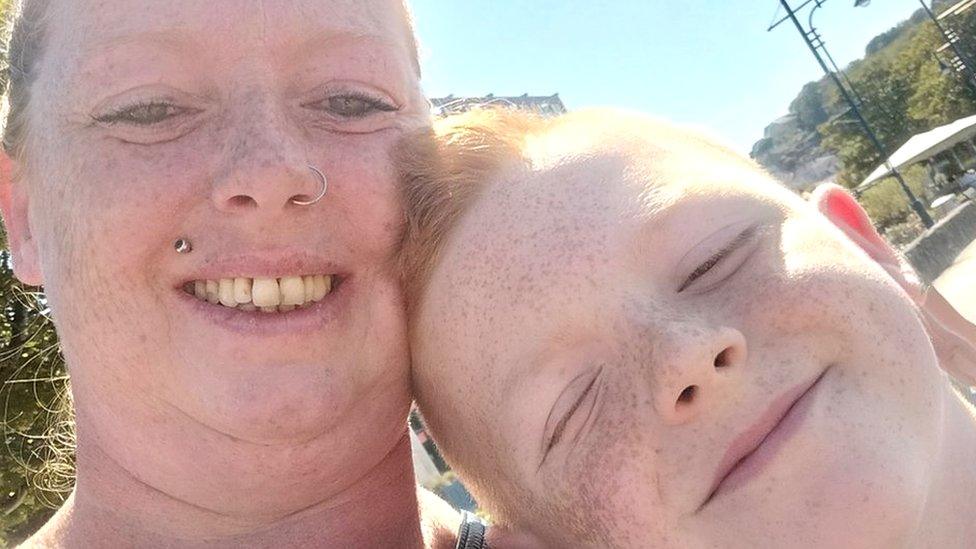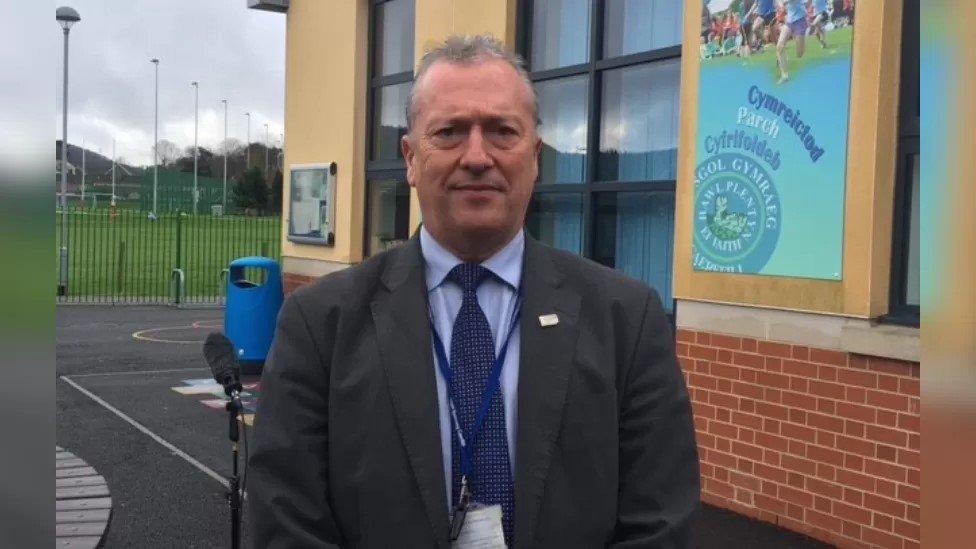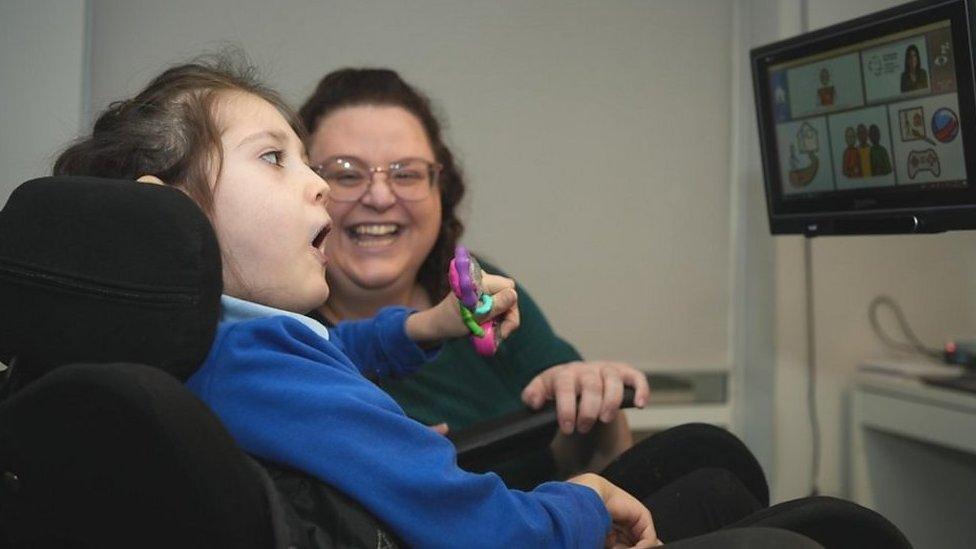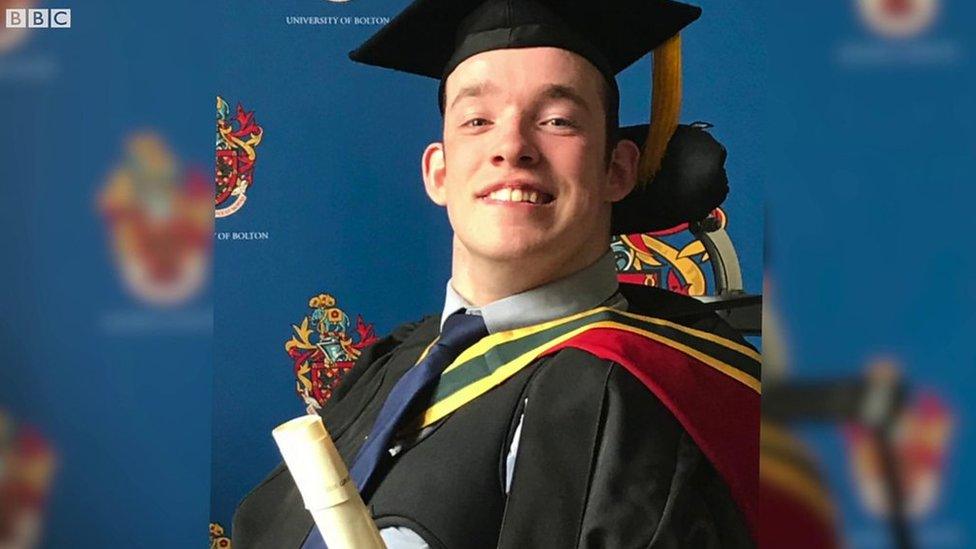Additional learning needs: Mum feels a failure over ALN
- Published

Sian Kinson has been fighting to get support for her son with learning difficulties
A mother has been left feeling "like a failure" after struggling to get additional learning needs (ALN) support for her son.
Sian Kinson and Niall, 11, have been told they will have to wait 26 months for an assessment.
The Welsh government recently pledged £20m to improving ALN facilities as they phase in a new system.
It comes as a Welsh children's charity has said that there has been a 20% decrease in support being given.
ALN covers a broad range of support needs and, last year, the Welsh government brought in a new system which sought to ensure that all children in that position received an individual learning plan, regardless of severity.
After a doctor noticed that Niall showed traits of autism spectrum disorder (ASD) and attention deficit hyperactivity disorder (ADHD), Ms Kinson, from Neath, went to her son's school to voice her concerns.
It was decided that an appointment with the neurodevelopment team (NDT) would be made to determine Niall's diagnosis.
But she said it was only after "pushing and chasing" that she found out the appointment had never been made.
'Too complicated'
Ms Kinson's fight for support for her son started when he was in primary school.
He is currently on an Individual Development Plan (IDP), as required by the new ALN system.
However, his mum felt it was solely focused on attendance and trying to reintegrate him.
Ms Kinson believes the system is too complicated in its current form, especially for parents like herself who had no prior experience with learning difficulties.
"They need to make it simple for parents to know if your child is struggling," she said. "If you need A,B,C or D this is how you go about it."

What is ALN?
The ALN system started on 1 September 2021 and aims to replace the previous special education needs (SEN) code over a three year period.
Individual Development Plans are required to make it easier to tailor the education to each child's needs.
In 2020-21 there were 92,688 pupils with SEN/ALN. This dropped to 74,595 in 2021-22.

Ms Kinson was recently referred to the Child and Adolescent Mental Health Services (CAMHS).
"They told me he needs to be seen by the NDT because he's got traits of ASD, not mental health issues. So we wasted an hour of their time, the NHS's time and my time," she said.
The constant battles have left her feeling downbeat.
"I'm going to cause a detrimental effect on my son's education and his adult life because I can't get him seen or diagnosed any quicker.
"I feel like I'm failing as his mother even though it's the government that's failing with me."

Lynn Griffiths believes that the ALN code has provided better individual support but has increased the workload on staff
Lynn Griffiths, headteacher at Ysgol Gynradd Gymraeg Caerffili, said IDPs were more focused on the child's needs but the new legislation "has increased the workload of ALN co-coordinators".
Unlike some schools, they have enough staff to support children with learning difficulties.
"Staff take over ALN coordinators' classes when they're not there. In a primary context, most ALN coordinators have responsibility for running classes as well," he said.
'Weeks of silence'
Emma, who did not want her surname used, has a 15-year-old daughter with dyslexia - a learning condition which affects her reading and spelling abilities.
She said she had been locked in a battle with her daughter's school about ALN support.
By the end of Year 7 it was clear to Emma that the staff "had no idea of the difficulties" her daughter was facing.
Emma, from Llanelli, Carmarthenshire, hoped a copy of her daughter's diagnosis - acquired from a GP - would help.
"They said somebody would talk to her within two weeks. After four weeks without hearing anything I phoned again. It's been like this over and over again," she said.

There are fears some children are being left behind since the change to ALN
After going to her local MP, Emma is feeling cautiously optimistic about the future.
"I'm having to tell the school what the process is to get from A to B because they don't understand it. Now she's started Year 11 she's beginning to see the support in the classroom.
"They've finally put a plan in place to make school life easier for her. Obviously it's early days to see if those promises will be kept."
The Welsh government recently announced , external£20m funding to improve ALN facilities.
Education Minister Jeremy Miles has stressed that the change to ALN represents a "big step forward for us."
"We'll be keenly listening to our practitioners telling us about how the system is operating on the ground ," he said.
"The whole purpose of the IDP is to make it easier for schools to meet the needs of individual owners and to work with health services to do that."
'Open and flexible'
When asked about the difficulties parents have faced, he stressed that help was tailored to the needs of each child.
He said: "The new regime in place now is that support is available to an individual and doesn't follow a diagnosis.
"It provides a much more open and flexible means of making sure that at the heart of the provision is that particular individual."
SNAP Cymru - a charity which has dedicated resources to providing advice for parents with questions regarding the change to ALN - has seen a 20% increase in people seeking its guidance since April, alongside the fall in ALN register numbers.
Chief executive Caroline Rawson said: "Our experience is telling us that some schools have revised their SEN/ALN registers as inconsistencies have been recognised for quite some time. This may be one of the reasons for a decrease [on the register].
"Another could be that with the importance being placed on differentiation, quality teaching and catch-up groups, some children that would have been placed on the register previously may not now require alternative learning provision as defined in the ALN code."
- Published21 September 2019

- Published12 October 2022

- Published28 September 2022

- Published21 August 2018
